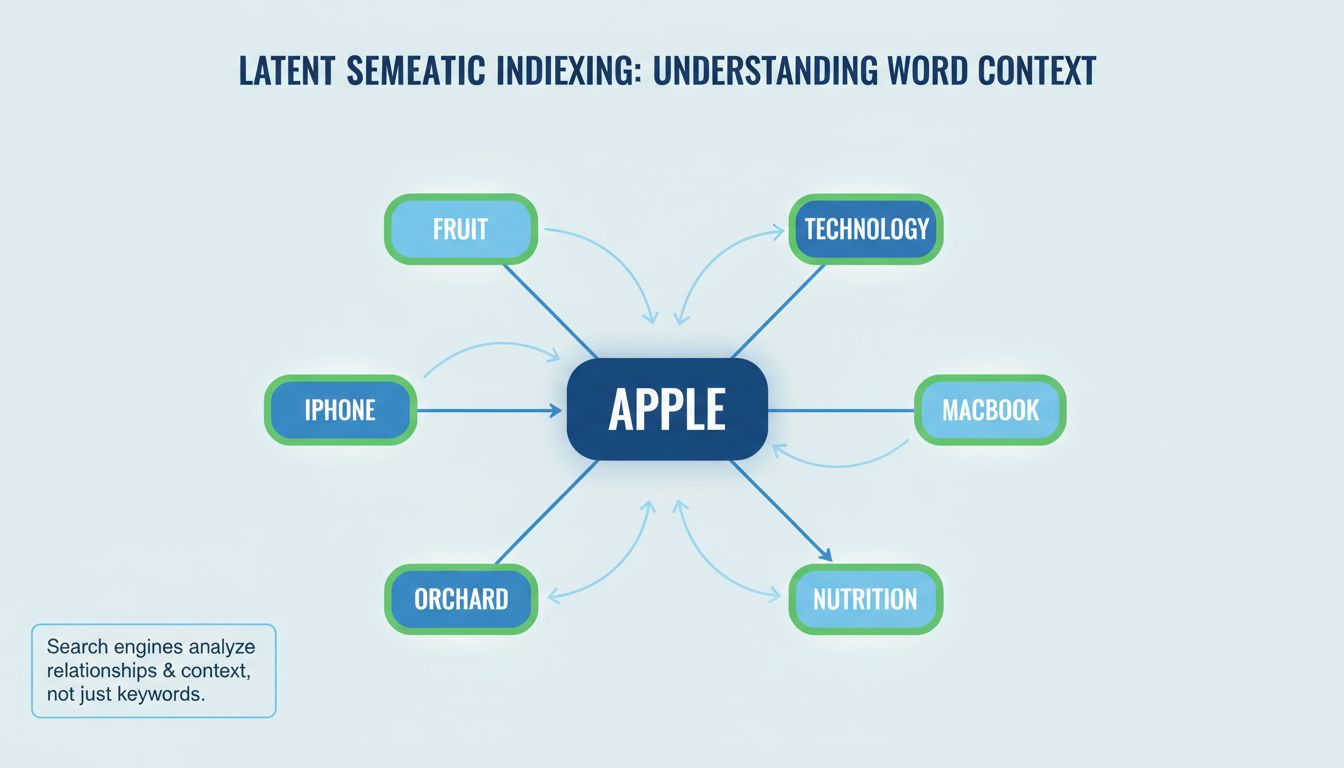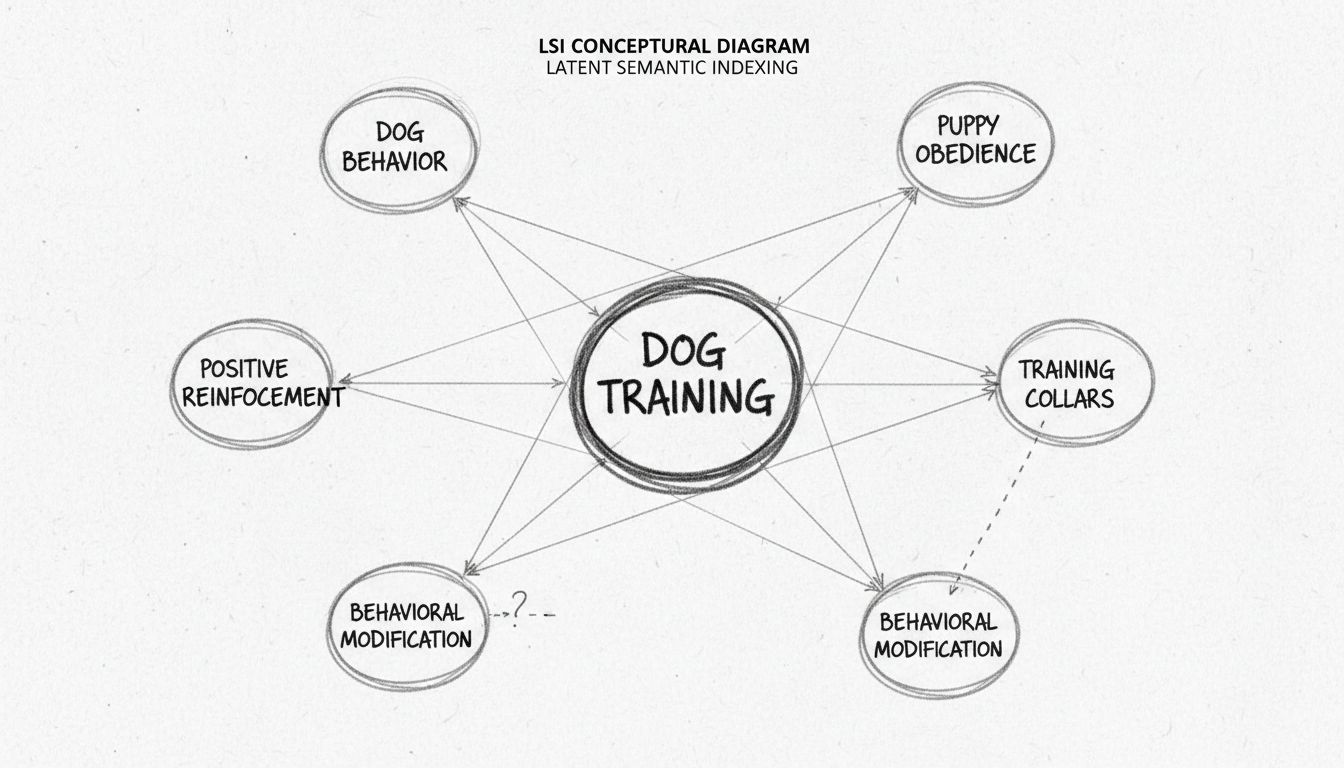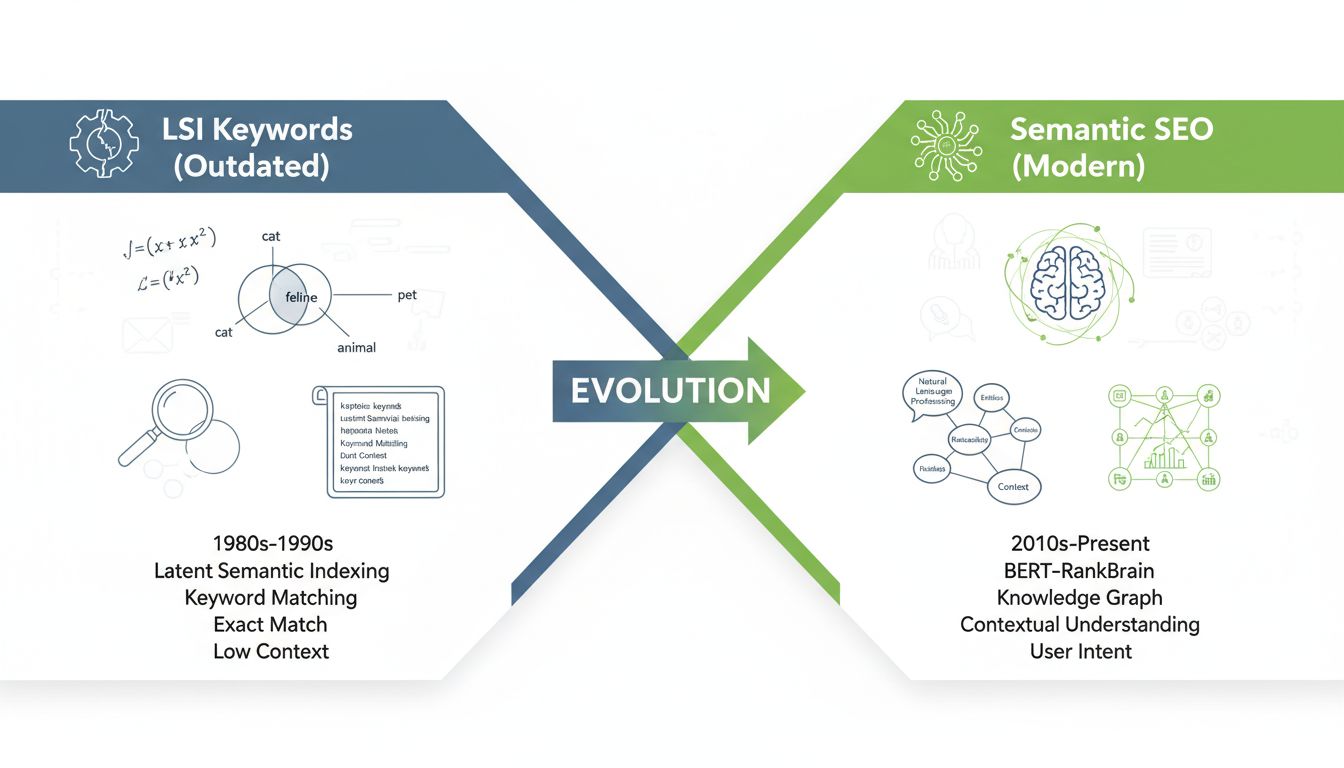
How Does Latent Semantic Indexing Affect SEO? Complete 2025 Guide
Learn how Latent Semantic Indexing impacts SEO in 2025. Discover how LSI keywords improve search rankings, content relevance, and organic traffic while reducing...
Learn how Latent Semantic Indexing (LSI) enhances SEO by improving search relevance, reducing spam, and helping search engines understand content context.
Latent Semantic Indexing (LSI) is a mathematical method used in natural language processing and information retrieval to identify relationships between terms and concepts within a body of text. Developed in the 1980s, LSI was designed to improve the accuracy of information retrieval by analyzing the patterns of word co-occurrence in documents. The main objective of LSI is to enhance search accuracy by understanding the context around words, thus reducing ambiguity and improving the relevancy of search results.
LSI originated as a significant breakthrough in information retrieval systems, aiming to solve the synonymy and polysemy problems inherent in language. Synonymy refers to different words having the same meaning, while polysemy involves a single word having multiple meanings. By analyzing large text corpora, LSI was able to determine patterns and relationships between words, effectively capturing the underlying semantic structure of the data. Over time, LSI has evolved and inspired modern techniques in natural language processing and machine learning , which have become integral to search engine technology.
While Google has stated that it does not specifically use LSI technology in its algorithms, the concept of contextual understanding that LSI embodies is integral to modern SEO practices. Search engines today use advanced machine learning techniques and natural language processing (NLP) to understand content contextually. This involves identifying semantically related terms that help clarify the subject matter of a webpage.
According to the Backlinko’s comprehensive list on Google’s ranking factors, LSI keywords help search engines extract meaning from words that have more than one interpretation. By utilizing LSI keywords, websites can increase their visibility in search results by aligning more closely with user search intent.
In affiliate marketing , driving organic traffic to your site is crucial for generating sales and commissions. Implementing LSI keywords can significantly enhance your content’s visibility by improving its relevance to search queries.
While LSI technology itself is not directly used by Google, the SEO industry often uses the term “LSI keywords” to describe semantically related keywords that enhance content relevance. It is essential to recognize that:
As per insights from JEMSU and Link Whisper, LSI keywords play a crucial role in enhancing organic click distribution and improving search engine rankings. By creating a rich tapestry of relevance and context, businesses can achieve sustained online success through strategic LSI keyword integration.
Monitor and Adjust: Use tools to track keyword performance and make necessary adjustments to optimize content for both search engines and users.
Analyze Competitors: Study top-ranking pages for your target keywords to identify common themes and related terms they use.
Create Comprehensive Content: Cover subtopics and related angles that provide value to users, thereby naturally incorporating LSI keywords.
Enter Latent Semantic Indexing (LSI) — a powerful tool that can transform your affiliate marketing efforts. Whether you’re new to SEO or a seasoned content creator struggling to make it to the coveted first page of search results, understanding LSI can be your secret weapon.
Latent Semantic Indexing is a concept used by search engines to understand the context and intent behind a search query. Imagine a web of related words and phrases—LSI helps search engines connect these dots, offering more accurate search results. For instance, if your content revolves around “umbrellas in photography,” LSI keywords might include terms like “soft boxes,” “reflective umbrellas,” or “lighting techniques,” which help search engines grasp the context more effectively.
In the early days of SEO, keyword stuffing was a common practice, but search engines have since become more sophisticated. LSI is now a crucial component of SEO because it ensures your content is relevant and contextually accurate, thus improving its visibility and ranking. For affiliate marketers , incorporating LSI keywords into your content can enhance its relevance, helping you attract more targeted traffic and, ultimately, increase conversions.
Begin with simple tools like Google’s “People Also Ask” and “Related Searches” to discover potential LSI keywords. These areas provide insights into what users are querying around your primary keyword, guiding you to create content that meets their needs.
Platforms like LSIGraph, Keywords Everywhere, and KeywordTool.io are invaluable for identifying LSI keywords. These tools analyze search data to suggest relevant terms and phrases that complement your primary keyword, helping you craft content that resonates with your audience.
Use tools like MonkeyLearn to create word clouds from top-ranking articles. By analyzing commonly used terms in successful content, you can pinpoint LSI keywords that are pivotal to your niche, allowing you to refine your content strategy.
Harnessing the power of Latent Semantic Indexing is not just about boosting your SEO; it’s about creating content that truly connects with your audience. By integrating LSI keywords into your affiliate marketing strategy , you open doors to improved search engine rankings, increased traffic, and higher conversions. Ready to elevate your affiliate marketing game? Start incorporating LSI keywords today and watch your success soar.
LSI keywords matter because they help search engines appropriately index the content on your website.
Google's algorithms are constantly evolving and changing. However, it is generally accepted that Google does use LSI keywords to some extent in its ranking algorithms.
Latent semantic indexing is a technique used by search engines to improve the accuracy of search results by finding words that are semantically related to the search term.
LSI enhances the contextual relevance of your content, making it easier for search engines to understand and rank. This, in turn, improves visibility and drives more organic traffic to your affiliate links.
No, LSI keywords should complement your primary keywords. They provide additional context and help diversify your content, making it more robust and comprehensive.
Regularly updating your content with fresh LSI keywords can ensure it remains relevant and competitive. Monitor changes in search trends and adjust your keywords accordingly.
Discover how leveraging LSI and semantic keywords can improve your content’s search relevance and drive more organic traffic. Explore Post Affiliate Pro's solutions for affiliate marketers.

Learn how Latent Semantic Indexing impacts SEO in 2025. Discover how LSI keywords improve search rankings, content relevance, and organic traffic while reducing...

Discover how Latent Semantic Indexing (LSI) enhances your content's contextual relevance, improves search engine rankings, and drives more organic traffic to yo...

Discover whether Google uses LSI keywords and learn how modern semantic search actually works. Understand BERT, RankBrain, and entity-based optimization for bet...
Cookie Consent
We use cookies to enhance your browsing experience and analyze our traffic. See our privacy policy.